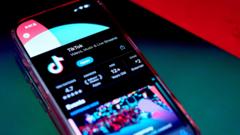TikTok is once again accessible to users in the United States, as Apple and Google have reinstated the app in their stores following assurances from the Trump administration regarding the enforcement of a potential ban. This development comes after President Donald Trump signed an executive order delaying the enforcement deadline for a ban on TikTok until April 5, allowing the app to continue operating for the time being.
The Chinese-owned platform, which has over 170 million users in the U.S., had faced a temporary blackout last month as the deadline approached for compliance with legislation demanding that TikTok's Chinese parent company, ByteDance, divest its U.S. operations to a neutral party. This bipartisan initiative was framed around concerns that TikTok might serve as a surveillance tool for China, a claim that both TikTok and Chinese authorities have disputed.
The law has garnered support from politicians on both sides of the aisle and was upheld by the Supreme Court, bolstering the argument for increased scrutiny of foreign apps with significant American user bases. While Trump had initially favored banning TikTok during his presidency, he indicated a shift in his stance during the last election campaign, expressing appreciation for the platform's engagement levels during his bid for re-election.
When TikTok became available again, users received messages thanking Trump by name, a reflection of the platform's ongoing navigation of its relationship with U.S. politics. Trump has indicated a preference for resolving the ownership issue in a flexible manner. He hinted at a potential joint ownership model that would satisfy government concerns while allowing the app to continue functioning.
Prominent figures such as Oracle co-founder Larry Ellison and entrepreneur Elon Musk have emerged as potential buyers of TikTok, while the app's popularity has drawn interest from MrBeast, one of the most followed creators on YouTube. As discussions around ownership and compliance continue, TikTok's future in the U.S. remains uncertain, tied closely to the evolving landscape of U.S.-China relations and domestic politics.
As unofficial downloads of TikTok surged in the aftermath of its removal, the discourse around its ownership and governance will likely remain a focal point in discussions of digital sovereignty and international business relations.
The Chinese-owned platform, which has over 170 million users in the U.S., had faced a temporary blackout last month as the deadline approached for compliance with legislation demanding that TikTok's Chinese parent company, ByteDance, divest its U.S. operations to a neutral party. This bipartisan initiative was framed around concerns that TikTok might serve as a surveillance tool for China, a claim that both TikTok and Chinese authorities have disputed.
The law has garnered support from politicians on both sides of the aisle and was upheld by the Supreme Court, bolstering the argument for increased scrutiny of foreign apps with significant American user bases. While Trump had initially favored banning TikTok during his presidency, he indicated a shift in his stance during the last election campaign, expressing appreciation for the platform's engagement levels during his bid for re-election.
When TikTok became available again, users received messages thanking Trump by name, a reflection of the platform's ongoing navigation of its relationship with U.S. politics. Trump has indicated a preference for resolving the ownership issue in a flexible manner. He hinted at a potential joint ownership model that would satisfy government concerns while allowing the app to continue functioning.
Prominent figures such as Oracle co-founder Larry Ellison and entrepreneur Elon Musk have emerged as potential buyers of TikTok, while the app's popularity has drawn interest from MrBeast, one of the most followed creators on YouTube. As discussions around ownership and compliance continue, TikTok's future in the U.S. remains uncertain, tied closely to the evolving landscape of U.S.-China relations and domestic politics.
As unofficial downloads of TikTok surged in the aftermath of its removal, the discourse around its ownership and governance will likely remain a focal point in discussions of digital sovereignty and international business relations.




















